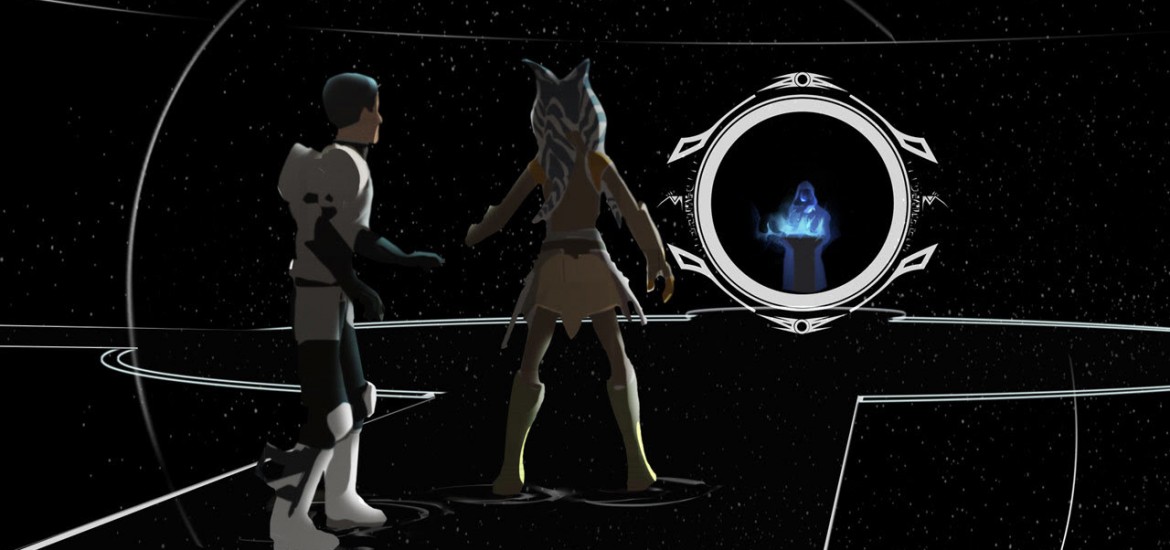Salutations, all! Reminder: this is not a full review. Instead, we just look at one or two things because I was so enraptured that I literally forgot to take notes. No, seriously. As always, SPOILERS from here on out.
This week’s offering of Rebels culminated in A World Between Worlds, which … featured a lot of stars. Honestly, did anyone else get the feeling that they ran over budget and couldn’t afford to do much more than stars, and then someone went ‘eh, we’ll just cover it up with some wibbly wobbly, timey wimey …stuff.’ Just me?
Covering Your Bases

Okay, it may have been a tad unfair to say that it was bare bones because it was over budget because this episode packed a lot into nothingness. Not only that but it did it enigmatically! What other show can makes such a big thing out of staring at doorways to nowhere? That sounds sarcastic, but I genuinely mean it, with all the sincerity I can muster.

And that enigmatic nothingness was well written – because that wasn’t all that was present in the episode. Look at the structure of the episode itself: It began, with the last episode, by setting up the importance of the nothingness in the form of an Imperial operation under the control of one of Emperor Palpatine’s minions (who we know is important because he has no weapons. It’s something of a rule that the more important a baddie, the smaller the weapon the have, or indeed have no weapon at all. While I’m no mindreader, I don’t believe it’s a coincidence that the only weapon Thrawn has is a small pistol). So right away we know this nothingness, despite what it looks like, is A Big Deal. And then, rather than explaining the nothingness, they, rather poetically, give us nothing. The place merely exists, and it rudely continues to exist and continues to give us no reason whatsoever.
But! But then we go away from the enigmatic nothingness, this tantalising wonderland, this astrologer’s wet dream, and we go back to the real world inhabited by Sabine and the Emperor’s lackey, Minister Hydan* to talk about … art? Writing this, now, it doesn’t sound all that interesting, and I’m sure that the writers had to sell that idea at first. But as we saw it quickly proved vital – not just by showing us how they figure out how to lock the thing again, but by showing us a brief glimpse of how the whole thing works at all.
*I will be supremely disappointed if the origin of that name is not that two writers were sitting at a table, wondering out loud, ‘what should we call this bad guy, and the other, spotting a friend coming into the room, went ‘hi Dan!’ and the former accepted that without question. Please. I need this.
…Except they don’t. Not really. And that’s okay! They explain it just enough that we understand how it works on a practical level. We learn how to use it, not how it works. This is a bit of writing sleight of hand: show the viewer how to use something weird, so that the viewer can then imagine themselves in that situation, doing that thing, is often much more effective than telling us, the viewer, how a thing works. The result is that while we don’t really end up understanding it, we do understand what it feels like. Because of this both of our desires, for the mystical Force, and the nitty gritty realism, are satisfied.

[CAPTION] Mortis haters, however, will be unsatisfied.
And of course it sets up the ending ahead of time so that we experience a seemless storytelling experience, without being bogged down by questions of ‘how does she know this? What are they doing now?’ or having needless chaff in the form of the rebels running around trying to figure out how to close it. Instead we get what we got: a quick, tidy ending wrapped in a little bow. That was some nifty writing.
Lessons To Be Learned

This episode was special for … a lot of reasons, but one of the big ones is that Ezra at last learned Kanan’s final lesson. In the words of Ahsoka: ‘Kanan found the moment he was needed most, and he did what he had to do, for everyone.’ and Ezra learned, finally, how to let go.
Except … was that a lesson that he absolutely needed to learn at the expense of someone else’s life? I’m not convinced of this. Oh, don’t get me wrong, it was quite moving, and changing it would probably have robbed Kanan’s final moments of their impact, but at the same time he had already saved one person from dying, and he had the power to do so again. I see absolutely nothing wrong with sacrificing personal growth for, you know, reaching through the portal to save Kanan after Kanan himself had saved everyone else.
It reminds me of a thought experiment one of my religious friends used to trot out: lying is morally wrong and a sin, but what if you’re hiding a Jewish family from Nazis and the Nazis come knocking, do you lie to the Nazis or do you stay morally correct and tell the truth? This is apparently a quandary of the highest order, since personal discomfort is surely equal to the deaths of other people.
Ezra’s situation is essentially the same, albeit in reverse: learn a lesson or save a life. He, selfishly, chose wrong.
